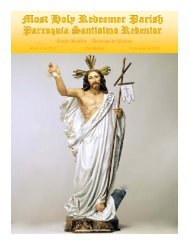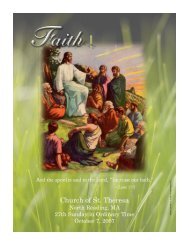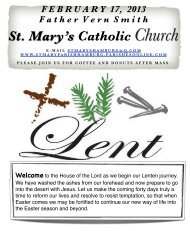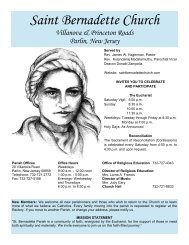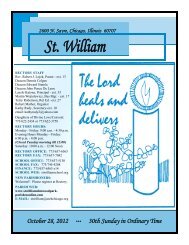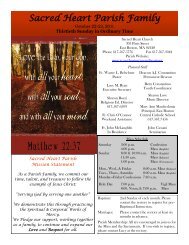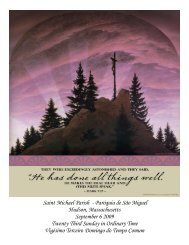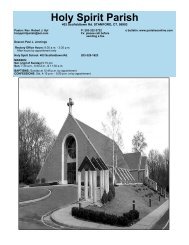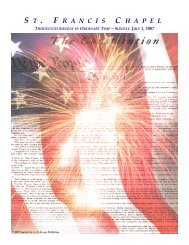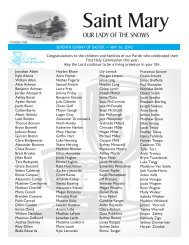Tú, como hombre de Dios, lleva una vida de rectitude, piedad, fe ...
Tú, como hombre de Dios, lleva una vida de rectitude, piedad, fe ...
Tú, como hombre de Dios, lleva una vida de rectitude, piedad, fe ...
Create successful ePaper yourself
Turn your PDF publications into a flip-book with our unique Google optimized e-Paper software.
S T . F R A N C I S C H A P E L<br />
TWENTY-SIXTH SUNDAY IN ORDINARY TIME—SUNDAY, SEPTEMBER 30, 2007<br />
<strong>Tú</strong>, <strong>como</strong> <strong>hombre</strong> <strong>de</strong> <strong>Dios</strong>, <strong>lleva</strong> <strong>una</strong> <strong>vida</strong> <strong>de</strong> rectitu<strong>de</strong>, <strong>piedad</strong>,<br />
<strong>fe</strong> amor, paciencia, y mansedumbre.<br />
1 Timoteo 6:11
Page 2 St. Francis Chapel Pru<strong>de</strong>ntial Center, Boston<br />
“Happy Are They Whose Help Is Jacob’s God”<br />
Many years ago, there lived a king whom the<br />
people liked very much. He was fair, <strong>de</strong>dicated and<br />
magnanimous. At night, he would walk the city<br />
streets disguised as a citizen. His courtiers warned<br />
him about possible harm. But the king would<br />
always reply: “How can I serve my people unless I<br />
un<strong>de</strong>rstand how they live?”<br />
Psalm 146, the psalm for today’s liturgy,<br />
presents God as this type of king. The psalm opens<br />
by exhorting us: “Praise the Lord, my soul; I shall<br />
praise the Lord all my li<strong>fe</strong>, sing praise to my God<br />
while I live.” Here the psalmist <strong>de</strong>clares that God is<br />
worthy of our praise because only His faithfulness is<br />
flawless. Then the psalmist warns us to “put no trust<br />
in princes, in mere mortals powerless to save. When<br />
they breathe their last, they return to the earth; that<br />
day all their planning comes to nothing.” On page<br />
149 of his fine book The Lord is My Shepherd,<br />
Monsignor David Rosage gives us a clear<br />
explanation of this passage: “‘Put no trust in princes’<br />
can be un<strong>de</strong>rstood in two ways. First, it re<strong>fe</strong>rs to the<br />
powerful and rich lea<strong>de</strong>rs. Second, it embraces all<br />
human beings. These mortals cannot help us in most<br />
areas of our li<strong>fe</strong>. The psalmist makes this plea<br />
because he knows that the average person would<br />
more willingly put trust in other people than in<br />
God.”<br />
After this vigorous <strong>de</strong>scription of the King<br />
Whom we praise, the psalmist then speaks of that<br />
very same King Who walks among His people.<br />
“Happy those whose help is Jacob’s God, whose<br />
help is in the Lord, their God, the maker of heaven<br />
and earth seas and all that is in them, who keeps<br />
faith forever, secures justice for the oppressed, gives<br />
food to the hungry.” On page 348 of the second<br />
volume of an equally fine book The Psalms, Dr.<br />
George Knight gives us a cogent <strong>de</strong>scription of these<br />
verses. He tells us that “…..a man or woman may<br />
promise you a gift of a sum of money and may even<br />
agree to set down this kind of<strong>fe</strong>r in writing. But<br />
before he can put pen to paper he most unfort<strong>una</strong>tely<br />
falls down <strong>de</strong>ad, Because of that the money never<br />
becomes your after all. But God does not die. He<br />
keeps faith forever, for of course he is the living<br />
God.”<br />
The psalmist now continues his compelling<br />
<strong>de</strong>scription of the King Who moves among His<br />
people: “The Lord sets prisoners free; the Lord gives<br />
sight to the blind. The Lord raises up those who are<br />
bowed down; the Lord loves the righteous. The<br />
Lord protects the stranger, sustains the widow, but<br />
thwarts the way of the wicked.” On page 349 of his<br />
above-mentioned book, Dr. Knight gives us a vivid<br />
explanation of this passage: “Imagine a king…..in<br />
the days in the civilization in which our psalmist<br />
lived. The king rules as mighty God over his wi<strong>de</strong><br />
dominions, seeking out from his splendid pillared<br />
palace the poor folk who are languishing in prison in<br />
the capital city, the blind and the beggars on its<br />
streets, the exhausted displaced persons and el<strong>de</strong>rly<br />
forced laborers in <strong>de</strong>tention camps, widows living in<br />
hovels, orphans stealing to get something to eat- but<br />
can you imagine such a king? But our King, our<br />
God, is actually like that! Therefore, claims the<br />
psalmist, God is worthy of our trust.”<br />
Psalm 146 is a short but compelling work. It<br />
combines affirmations of God’s gran<strong>de</strong>ur with an<br />
acknowledgement of His humble service. He who is<br />
mighty walks among His people.<br />
Intentions of Pope Benedict XVI for the Month of October<br />
Father Bob<br />
General: That the Christians who are in minority situations may have the<br />
strength and. courage to live their faith and persevere in bearing witness<br />
to it.<br />
Mission: That World Missionary Day may be a propitious occasion for<br />
kindling an ever greater missionary awareness in every baptized person.
Oblates of the Virgin Mary<br />
“Dichoso aquel que al <strong>Dios</strong> <strong>de</strong> Jacob tiene <strong>de</strong> ayuda”<br />
Hace muchos años, vivía un rey el que se caía bien a<br />
su pueblo. Era justo, <strong>de</strong>dicado y magnánimo. De noche,<br />
andaba por las calles <strong>de</strong> la ciudad disfrazado <strong>de</strong> ciudadano.<br />
Sus cortesanos lo advertían <strong>de</strong>l eventual daño que podía recibir.<br />
Pero el rey siempre contestaba: “¿Cómo puedo servir a mi<br />
gente a menos que comprenda cómo viven?”<br />
El Salmo 146, el salmo para la liturgia <strong>de</strong> hoy,<br />
presenta a <strong>Dios</strong> <strong>como</strong> este tipo <strong>de</strong> rey. El Salmo se abre<br />
exhortándonos: “¡Alaba al Señor, alma mía! Mientras viva yo<br />
quiero alabar al Señor, quiero salmodiar para el Señor mientras<br />
exista.” Aquí el salmista <strong>de</strong>clara que <strong>Dios</strong> es digno <strong>de</strong> nuestra<br />
alabanza porque sólo su fi<strong>de</strong>lidad es intachable. Luego el<br />
Salmista nos advierte que “no pongas tu confianza en los que<br />
mandan, ni en el mortal, que no pue<strong>de</strong> salvarte; no bien se le va<br />
el alma, vuelve al polvo, y ese día se acaban sus proyectos.”<br />
En la página 149 <strong>de</strong> su excelente libro, The Lord is My<br />
Shepherd (El Señor es mi pastor), Monseñor David Rosage nos<br />
da <strong>una</strong> explicación clara <strong>de</strong> este pasaje: “‘No pongas tu<br />
confianza en los que mandan’ pue<strong>de</strong> enten<strong>de</strong>rse en dos modos.<br />
Primero, se refiere a los je<strong>fe</strong>s ricos y potentes. En segundo<br />
lugar abraza a todos los seres humanos. Estos mortales no<br />
pue<strong>de</strong>n ayudarnos en la mayoría <strong>de</strong> las áreas <strong>de</strong> nuestra <strong>vida</strong>.<br />
El salmista pi<strong>de</strong> eso porque sabe que la persona media<br />
<strong>de</strong>positaría con más ganas su confianza en otras personas que<br />
en <strong>Dios</strong>.” Después <strong>de</strong> su <strong>de</strong>scripción enérgica <strong>de</strong>l Rey a quien<br />
alabamos, el salmista habla <strong>de</strong> ese mismo Rey el que anda en<br />
medio <strong>de</strong> su pueblo. “Dichoso aquel que al <strong>Dios</strong> <strong>de</strong> Jacob tiene<br />
<strong>de</strong> ayuda… en el que hizo los cielos y la tierra, el mar y todo<br />
cuanto ellos encierran. Él su lealtad conserva siempre, y su<br />
justicia da a los oprimidos, proporciona su pan a los<br />
hambrientos.” En la página 348 <strong>de</strong>l segundo volumen <strong>de</strong> otro<br />
libro igualmente excelente, The Psalms (Los Salmos), Dr.<br />
George Knight nos da <strong>una</strong> <strong>de</strong>scripción convincente <strong>de</strong> estos<br />
versículos. Nos dice que “un <strong>hombre</strong> o mujer pue<strong>de</strong> prometerle<br />
a usted un regalo <strong>de</strong> <strong>una</strong> suma <strong>de</strong> dinero y incluso pue<strong>de</strong><br />
consentir <strong>de</strong> poner por escrito esta o<strong>fe</strong>rta generosa Pero antes<br />
<strong>de</strong> que pueda poner la tinta en la carta <strong>de</strong>sgraciadamente se cae<br />
muerto. Por eso el dinero al final no se hace tuyo. Pero <strong>Dios</strong><br />
no se muere. Él su lealtad conserva siempre, pues claro es el<br />
<strong>Dios</strong> viviente.”<br />
El salmista ahora continúa su <strong>de</strong>scripción po<strong>de</strong>rosa <strong>de</strong>l<br />
Rey quien se mueve entre su pueblo: “El Señor <strong>de</strong>ja libres a los<br />
presos, el Señor da la vista a los ciegos, el Señor en<strong>de</strong>reza a los<br />
encorvados, el Señor ama a los justos; da el Señor protección al<br />
forastero, y reanima al huérfano y a la viuda, mas <strong>de</strong>svía el<br />
camino <strong>de</strong> los malvados.” En la página 349 <strong>de</strong>l arriba<br />
mencionado libro, Dr. Knight nos da <strong>una</strong> explicación ví<strong>vida</strong> <strong>de</strong><br />
este pasaje: “Se imagine un rey… en los días <strong>de</strong> la civilización<br />
en la que vivía nuestro salmista. El rey reina <strong>como</strong> <strong>Dios</strong><br />
po<strong>de</strong>roso sobre sus dominios amplios, buscando <strong>de</strong>s<strong>de</strong> su<br />
palacio esplendido con pilares a la gente pobre quien se pudre<br />
en la cárcel en la ciudad capital, a los ciegos y a los mendigos<br />
en sus calles, a los <strong>de</strong>splazados agotados y a los ancianos<br />
obreros obligados en los campamentos <strong>de</strong> <strong>de</strong>tención, a las<br />
viudas quienes viven en jacales, a los huérfanos quienes roban<br />
para tener algo para comer; pero ¿usted pue<strong>de</strong> imaginar a un tal<br />
Page 3<br />
rey? Sin embargo nuestro Rey, nuestro <strong>Dios</strong>, ¡es tal <strong>como</strong> ese!<br />
Entonces, afirma el salmista, <strong>Dios</strong> es digno <strong>de</strong> nuestra<br />
confianza.”<br />
El Salmo 146 es <strong>una</strong> obra corta pero po<strong>de</strong>rosa.<br />
Combina afirmaciones <strong>de</strong> la gran<strong>de</strong>za <strong>de</strong> <strong>Dios</strong> con el<br />
reconocimiento <strong>de</strong> su servicio humil<strong>de</strong>. Él quien es po<strong>de</strong>roso<br />
camina en medio <strong>de</strong> su pueblo.<br />
“No hay nada mas hermoso,<br />
que encontrar a Cristo y comunicarlo<br />
a todos” ( Benedicto XVI)<br />
GRUPO DE ORACION BIBLICA<br />
aquí en la Capilla San Francisco<br />
todos los jueves,<br />
<strong>de</strong> 6:30 a 7:30 p.m.<br />
para jóvenes, matrimonios,<br />
mayores <strong>de</strong> edad<br />
P. David OMV<br />
1 ottobre<br />
UNA NOVITA’<br />
per quelli di lingua italiana<br />
INCONTRI DI PREGHIERA BIBLICA<br />
— per tutti —<br />
qui nella Cappella St. Francis:<br />
ogni lunedi,<br />
dalle 6:30 alle 7:30 p.m.<br />
P. David OMV<br />
Padre Bob
Page 4 St. Francis Chapel Pru<strong>de</strong>ntial Center, Boston<br />
St. Joseph Retreat House<br />
Schedule of Upcoming Events!<br />
Oct. 5-7: Directed Retreat Weekend<br />
Oct. 12-14: Directed Retreat Weekend<br />
Oct. 27: Day of Recollection (Women)<br />
To make reservations or for more<br />
information, call (617) 698-6785, ext. 102<br />
or e-mail omvparishmission@msn.com<br />
St. Joseph Retreat House,<br />
65 Fr. Carney Drive,<br />
Milton, MA,<br />
02186<br />
The Upper Room<br />
St. Clement’s Shrine, Upper Room<br />
1105 Boylston, Boston, MA<br />
Please join us for a new cycle of illuminating<br />
presentations! Fellowship is at 7:00 p.m. and<br />
talks begin at 7:15 p.m.<br />
October 10: “Sacred Art of Icon Painting”<br />
Fr. Dave Yankauskas, OMV presents<br />
the history and technique of this art.<br />
October 24: “Catholic Movie Night”<br />
Fr. John Wykes, OMV is your host for<br />
this evening of quality entertainment.<br />
October 4 is the memorial of St. Francis of Assisi, and<br />
therefore is a special day for us at St. Francis Chapel.<br />
If you are able, join us for our regular daily Mass<br />
schedule on Thurday, October 4 as we celebrate the<br />
Solemnity of St. Francis of Assisi!<br />
Books After<br />
Breakfast<br />
We invite you to a Catholic Book Discussion at St. Clement<br />
Eucharistic Shrine.<br />
Books After Breakfast will of<strong>fe</strong>r an introduction to some of the<br />
Catholic/Christian writings of our day.<br />
Presented by Amicizia Cristiana, Books After Breakfast is led<br />
by Steve Fahrig. Steve is the pastoral associate at St. Brigid and<br />
Gate of Heaven parishes in South Boston and is pursuing a<br />
Licentiate in Sacred Theology at the Weston Jesuit School of<br />
Theology.<br />
Books After Breakfast<br />
Each Sat., 9:30 a.m. to 10:30 a.m. from Oct. 13 through Nov. 17<br />
Front Parlor, St. Clement’s, 1105 Boylston, Boston<br />
Cof<strong>fe</strong>e and snacks provi<strong>de</strong>d<br />
Womens’ Prayer Group<br />
Thursday, October 4, 2007<br />
7:00 p.m. to 8:30 p.m,<br />
St. Clement’s Eucharistic Shrine<br />
1105 Boyslton, Boston<br />
*Free Pregnancy Testing<br />
*Friendship Counseling and Support<br />
*Material Assistance<br />
*Adoption Information and Re<strong>fe</strong>rrals<br />
*Education, Career & Housing Info<br />
*Pre-Natal Care Re<strong>fe</strong>rrals<br />
call toll-free: 888 771-3914<br />
www.pregnancyhelpboston.org<br />
All Services are free and confi<strong>de</strong>ntial<br />
Also available in Spanish and Portuguese<br />
Sponsored by the Archdiocese of Boston
A Woman’s Concern: Saving and Changing Lives,<br />
One Woman and One Baby at a Time!<br />
Participate in the Baby Bottle Campaign of A Woman’s<br />
Concern.<br />
Oblates of the Virgin Mary<br />
Take one of the baby bottles that you see either at the front<br />
doors of the Chapel or in the Chapel Bookstore, fill it with<br />
change (silver goes the farthest!!) and return the bottle to the<br />
Pru Chapel by October 31st.<br />
Find out more about A Woman’s Concern:<br />
www.awomansconcern.org<br />
Venerable<br />
Fr. Lanteri<br />
and<br />
the Lay Vocation<br />
A presentation on the foun<strong>de</strong>r of the Oblates<br />
of the Virgin Mary, Venerable Fr. Lanteri, as<br />
a spiritual director of lay people and his<br />
counsel on how to live the lay vocation.<br />
Fr. Timothy Gallagher, OMV is the presenter<br />
for this event. Fr. Tim earned his doctorate<br />
from the Gregorian University in Rome in<br />
1983. He is the author of The Discernment<br />
of Spirits: An Ignatian Gui<strong>de</strong> to Everyday<br />
Living (2005), The Examen Prayer: Ignatian<br />
Wisdom for Our Lives Today (2006), and<br />
Spiritual Consolation: An Ignatian Gui<strong>de</strong> for<br />
Greater Discernment of Spirits (2007).<br />
Venerable Fr. Lanteri<br />
and the Lay Vocation<br />
Fr. Timothy Gallagher, OMV<br />
Thursday, October 18, 2007<br />
7:30 p.m. - 9:00 p.m.<br />
St. Clement’s Eucharistic Shrine<br />
(Upper Room)<br />
1105 Boylston<br />
Boston, MA<br />
Bible Study<br />
at St. Francis Chapel<br />
NOW IN THREE LANGUAGES!<br />
Bible Study in Italian (italiano)<br />
Mondays, 6:30 - 7:30 p.m.<br />
Bible Study in English<br />
Wednesdays, 6:00 - 7:00 p.m.<br />
Bible Study in Spanish (español)<br />
Thursdays, 6:30 - 7:30 p.m.<br />
Page 5
Page 6 St. Francis Chapel Pru<strong>de</strong>ntial Center, Boston<br />
Benedict XVI: Sacramentum Caritatis (76-78)<br />
A eucharistic form of Christian li<strong>fe</strong>, membership in the<br />
Church<br />
76. The importance of Sunday as the Dies Ecclesiae brings us<br />
back to the intrinsic relationship between Jesus' victory over evil<br />
and <strong>de</strong>ath, and our membership in his ecclesial body. On the<br />
Lord's Day, each Christian rediscovers the comm<strong>una</strong>l dimension<br />
of his li<strong>fe</strong> as one who has been re<strong>de</strong>emed. Taking part in the<br />
liturgy and receiving the Body and Blood of Christ intensifies<br />
and <strong>de</strong>epens our belonging to the one who died for us (cf. 1 Cor<br />
6:19ff; 7:23). Truly, whoever eats of Christ lives for him. The<br />
eucharistic mystery helps us to un<strong>de</strong>rstand the profound<br />
meaning of the communio sanctorum. Communion always and<br />
inseparably has both a vertical and a horizontal sense: it is<br />
communion with God and communion with our brothers and<br />
sisters. Both dimensions mysteriously converge in the gift of the<br />
Eucharist. "Wherever communion with God, which is<br />
communion with the Father, with the Son and with the Holy<br />
Spirit, is <strong>de</strong>stroyed, the root and source of our communion with<br />
one another is <strong>de</strong>stroyed. And wherever we do not live<br />
communion among ourselves, communion with the Triune God<br />
is not alive and true either."(215) Called to be members of<br />
Christ and thus members of one another (cf. 1 Cor 12:27), we<br />
are a reality groun<strong>de</strong>d ontologically in Baptism and nourished<br />
by the Eucharist, a reality that <strong>de</strong>mands visible expression in the<br />
li<strong>fe</strong> of our communities.<br />
The eucharistic form of Christian li<strong>fe</strong> is clearly an ecclesial and<br />
communitarian form. Through the Diocese and the parish, the<br />
fundamental structures of the Church in a particular territory,<br />
each individual believer can experience concretely what it<br />
means to be a member of Christ's Body. Associations, ecclesial<br />
movements and new communities – with their lively charisms<br />
bestowed by the Holy Spirit for the needs of our time – together<br />
with Institutes of Consecrated Li<strong>fe</strong>, have a particular<br />
responsibility for helping to make the faithful conscious that<br />
they belong to the Lord (cf. Rom 14:8). Secularization, with its<br />
inherent emphasis on individualism, has its most negative<br />
ef<strong>fe</strong>cts on individuals who are isolated and lack a sense of<br />
belonging. Christianity, from its very beginning, has meant<br />
<strong>fe</strong>llowship, a network of relationships constantly strengthened<br />
by hearing God's word and sharing in the Eucharist, and<br />
enlivened by the Holy Spirit.<br />
Spirituality and eucharistic culture<br />
77. Significantly, the Synod Fathers stated that "the Christian<br />
faithful need a fuller un<strong>de</strong>rstanding of the relationship between<br />
the Eucharist and their daily lives. Eucharistic spirituality is not<br />
just participation in Mass and <strong>de</strong>votion to the Blessed<br />
Sacrament. It embraces the whole of li<strong>fe</strong>." (216) This<br />
observation is particularly insightful, given our situation today.<br />
It must be acknowledged that one of the most serious ef<strong>fe</strong>cts of<br />
the secularization just mentioned is that it has relegated the<br />
Christian faith to the margins of li<strong>fe</strong> as if it were irrelevant to<br />
everyday affairs. The futility of this way of living – "as if God<br />
did not exist" – is now evi<strong>de</strong>nt to everyone. Today there is a<br />
need to rediscover that Jesus Christ is not just a private<br />
conviction or an abstract i<strong>de</strong>a, but a real person, whose<br />
becoming part of human history is capable of renewing the li<strong>fe</strong><br />
of every man and woman. Hence the Eucharist, as the source<br />
and summit of the Church's li<strong>fe</strong> and mission, must be translated<br />
into spirituality, into a li<strong>fe</strong> lived "according to the Spirit" (Rom<br />
8:4ff.; cf. Gal 5:16, 25). It is significant that Saint Paul, in the<br />
passage of the Letter to the Romans where he invites his hearers<br />
to of<strong>fe</strong>r the new spiritual worship, also speaks of the need for a<br />
change in their way of living and thinking: "Do not be<br />
conformed to this world but be transformed by the renewal of<br />
your mind, that you may prove what is the will of God, what is<br />
good and acceptable and per<strong>fe</strong>ct" (12:2). In this way the Apostle<br />
of the Gentiles emphasizes the link between true spiritual<br />
worship and the need for a new way of un<strong>de</strong>rstanding and living<br />
one's li<strong>fe</strong>. An integral part of the eucharistic form of the<br />
Christian li<strong>fe</strong> is a new way of thinking, "so that we may no<br />
longer be children tossed to and fro and carried about with every<br />
wind of doctrine" (Eph 4:14).<br />
The Eucharist and the evangelization of cultures<br />
78. From what has been said thus far, it is clear that the<br />
eucharistic mystery puts us in dialogue with various cultures,<br />
but also in some way challenges them. (217) The intercultural<br />
character of this new worship, this logiké latreía, needs to be<br />
recognized. The presence of Jesus Christ and the outpouring of<br />
the Holy Spirit are events capable of engaging every cultural<br />
reality and bringing to it the leaven of the Gospel. It follows that<br />
we must be committed to promoting the evangelization of<br />
cultures, conscious that Christ himself is the truth for every man<br />
and woman, and for all human history. The Eucharist becomes a<br />
criterion for our evaluation of everything that Christianity<br />
encounters in dif<strong>fe</strong>rent cultures. In this important process of<br />
discernment, we can appreciate the full meaning of Saint Paul's<br />
exhortation, in his First Letter to the Thessalonians, to "test<br />
everything; and hold fast to what is good" (5:21).
Oblates of the Virgin Mary<br />
Benedicto XVI: Sacramentum Caritatis (76-78)<br />
Una forma eucarística <strong>de</strong> la <strong>vida</strong> cristiana,<br />
la pertenencia eclesial<br />
76. La importancia <strong>de</strong>l domingo <strong>como</strong> dies Ecclesiae nos remite<br />
a la relación intrínseca entre la victoria <strong>de</strong> Jesús sobre el mal y<br />
sobre la muerte y nuestra pertenencia a su Cuerpo eclesial. En<br />
e<strong>fe</strong>cto, en el Día <strong>de</strong>l Señor todo cristiano <strong>de</strong>scubre también la<br />
dimensión comunitaria <strong>de</strong> su propia existencia redimida.<br />
Participar en la acción litúrgica, comulgar el Cuerpo y la Sangre<br />
<strong>de</strong> Cristo quiere <strong>de</strong>cir, al mismo tiempo, hacer cada vez más<br />
íntima y profunda la propia pertenencia a Él, que murió por<br />
nosotros (cf. 1 Co 6,19 s.; 7,23). Verda<strong>de</strong>ramente, quién se<br />
alimenta <strong>de</strong> Cristo vive por Él. El sentido profundo <strong>de</strong> la<br />
communio sanctorum se entien<strong>de</strong> en relación con el Misterio<br />
eucarístico. La comunión tiene siempre y <strong>de</strong> modo inseparable<br />
<strong>una</strong> connotación vertical y <strong>una</strong> horizontal: comunión con <strong>Dios</strong> y<br />
comunión con los hermanos y hermanas. Las dos dimensiones<br />
se encuentran misteriosamente en el don eucarístico. « Don<strong>de</strong> se<br />
<strong>de</strong>struye la comunión con <strong>Dios</strong>, que es comunión con el Padre,<br />
con el Hijo y con el Espíritu Santo, se <strong>de</strong>struye también la raíz y<br />
el manantial <strong>de</strong> la comunión con nosotros. Y don<strong>de</strong> no se vive la<br />
comunión entre nosotros, tampoco es viva y verda<strong>de</strong>ra la<br />
comunión con el <strong>Dios</strong> Trinitario ».[215] Así pues, llamados a<br />
ser miembros <strong>de</strong> Cristo y, por tanto, miembros los unos <strong>de</strong> los<br />
otros (cf. 1 Co 12,27), formamos <strong>una</strong> realidad fundada<br />
ontológicamente en el Bautismo y alimentada por la Eucaristía,<br />
<strong>una</strong> realidad que requiere <strong>una</strong> respuesta sensible en la <strong>vida</strong> <strong>de</strong><br />
nuestras comunida<strong>de</strong>s.<br />
La forma eucarística <strong>de</strong> la <strong>vida</strong> cristiana es sin duda <strong>una</strong> forma<br />
eclesial y comunitaria. El modo concreto en que cada fiel pue<strong>de</strong><br />
experimentar su pertenencia al Cuerpo <strong>de</strong> Cristo se realiza a<br />
través <strong>de</strong> la diócesis y las parroquias, <strong>como</strong> estructuras<br />
fundamentales <strong>de</strong> la Iglesia en un territorio particular. Las<br />
asociaciones, los movimientos eclesiales y las nuevas<br />
comunida<strong>de</strong>s —con la vitalidad <strong>de</strong> sus carismas concedidos por<br />
el Espíritu Santo para nuestro tiempo—, así <strong>como</strong> también los<br />
Institutos <strong>de</strong> <strong>vida</strong> consagrada, tienen el <strong>de</strong>ber <strong>de</strong> dar su<br />
contribución específica para favorecer en los fieles la percepción<br />
<strong>de</strong> pertenecer al Señor (cf. Rm 14,8). El <strong>fe</strong>nómeno <strong>de</strong> la<br />
secularización, que comporta aspectos marcadamente<br />
individualistas, ocasiona sus e<strong>fe</strong>ctos <strong>de</strong>letéreos sobre todo en las<br />
personas que se aíslan, y por el escaso sentido <strong>de</strong> pertenencia. El<br />
cristianismo, <strong>de</strong>s<strong>de</strong> sus comienzos, supone siempre <strong>una</strong><br />
compañía, <strong>una</strong> red <strong>de</strong> relaciones vivificadas continuamente por<br />
la escucha <strong>de</strong> la Palabra, la Celebración eucarística y animadas<br />
por el Espíritu Santo.<br />
Espiritualidad y cultura eucarística<br />
77. Es significativo que los Padres sinodales hayan afirmado que<br />
« los fieles cristianos necesitan compren<strong>de</strong>r más profundamente<br />
las relaciones entre la Eucaristía y la <strong>vida</strong> cotidiana. La<br />
espiritualidad eucarística no es solamente participación en la<br />
Misa y <strong>de</strong>voción al Santísimo Sacramento. Abarca la <strong>vida</strong> entera<br />
».[216] Esta consi<strong>de</strong>ración tiene hoy un significado<br />
particular para todos nosotros. Se ha <strong>de</strong> reconocer que uno <strong>de</strong><br />
Page 7<br />
los e<strong>fe</strong>ctos más graves <strong>de</strong> la secularización, mencionada antes,<br />
consiste en haber relegado la <strong>fe</strong> cristiana al margen <strong>de</strong> la<br />
existencia, <strong>como</strong> si fuera algo inútil con respecto al <strong>de</strong>sarrollo<br />
concreto <strong>de</strong> la <strong>vida</strong> <strong>de</strong> los <strong>hombre</strong>s. El fracaso <strong>de</strong> este modo <strong>de</strong><br />
vivir « <strong>como</strong> si <strong>Dios</strong> no existiera » está ahora a la vista <strong>de</strong> todos.<br />
Hoy se necesita re<strong>de</strong>scubrir que Jesucristo no es <strong>una</strong> simple<br />
convicción privada o <strong>una</strong> doctrina abstracta, sino <strong>una</strong> persona<br />
real cuya entrada en la historia es capaz <strong>de</strong> renovar la <strong>vida</strong> <strong>de</strong><br />
todos. Por eso la Eucaristía, <strong>como</strong> fuente y culmen <strong>de</strong> la <strong>vida</strong> y<br />
<strong>de</strong> la misión <strong>de</strong> la Iglesia, se tiene que traducir en espiritualidad,<br />
en <strong>vida</strong> « según el Espíritu » (cf. Rm 8,4 s.; Ga 5,16.25). Resulta<br />
significativo que san Pablo, en el pasaje <strong>de</strong> la Carta a los<br />
Romanos en que invita a vivir el nuevo culto espiritual,<br />
mencione al mismo tiempo la necesidad <strong>de</strong> cambiar el propio<br />
modo <strong>de</strong> vivir y pensar: « Y no os ajustéis a este mundo, sino<br />
transformaos por la renovación <strong>de</strong> la mente, para que sepáis<br />
discernir lo que es la voluntad <strong>de</strong> <strong>Dios</strong>, lo bueno, lo que agrada,<br />
lo per<strong>fe</strong>cto » (12,2). De esta manera, el Apóstol <strong>de</strong> los gentiles<br />
subraya la relación entre el verda<strong>de</strong>ro culto espiritual y la<br />
necesidad <strong>de</strong> enten<strong>de</strong>r <strong>de</strong> un modo nuevo la <strong>vida</strong> y vivirla. La<br />
renovación <strong>de</strong> la mentalidad es parte integrante <strong>de</strong> la forma<br />
eucarística <strong>de</strong> la <strong>vida</strong> cristiana, « para que ya no seamos niños<br />
sacudidos por las olas y <strong>lleva</strong>dos al retortero por todo viento <strong>de</strong><br />
doctrina » (Ef 4,14).<br />
Eucaristía y evangelización <strong>de</strong> las culturas<br />
78. De todo lo expuesto se <strong>de</strong>spren<strong>de</strong> que el Misterio eucarístico<br />
nos hace entrar en diálogo con las di<strong>fe</strong>rentes culturas, aunque en<br />
cierto sentido también las <strong>de</strong>safía.[217] Se ha <strong>de</strong> reconocer el<br />
carácter intercultural <strong>de</strong> este nuevo culto, <strong>de</strong> esta logiké latreía.<br />
La presencia <strong>de</strong> Jesucristo y la efusión <strong>de</strong>l Espíritu Santo son<br />
acontecimientos que pue<strong>de</strong>n confrontarse siempre con cada<br />
realidad cultural, para <strong>fe</strong>rmentarla evangélicamente. Por<br />
consiguiente, esto comporta el compromiso <strong>de</strong> promover con<br />
convicción la evangelización <strong>de</strong> las culturas, con la conciencia<br />
<strong>de</strong> que el mismo Cristo es la verdad <strong>de</strong> todo <strong>hombre</strong> y <strong>de</strong> toda la<br />
historia humana. La Eucaristía se convierte en criterio <strong>de</strong><br />
valorización <strong>de</strong> todo lo que el cristiano encuentra en las<br />
di<strong>fe</strong>rentes expresiones culturales. En este importante proceso<br />
po<strong>de</strong>mos escuchar las muy significativas palabras <strong>de</strong> san Pablo<br />
que, en su primera Carta a los Tesalonicenses, exhorta: «<br />
examinadlo todo, quedándoos con lo bueno » (5,21).
Page 8 St. Francis Chapel Pru<strong>de</strong>ntial Center, Boston<br />
By Dr. Scott Hahn<br />
A Great Chasm: Twenty-Sixth Sunday in Ordinary Time (Cycle C)<br />
Readings:<br />
Amos 6:1, 4-7<br />
Psalm 146:7-10<br />
1 Timothy 6:11-16<br />
Luke 16:19-31 (see also 'Who is the Rich Man')<br />
The rich and powerful are visited with woe and exile in today's Liturgy - not for their wealth but for their refusal to share it; not for<br />
their power but for their indif<strong>fe</strong>rence to the suf<strong>fe</strong>ring at their door.<br />
The complacent lea<strong>de</strong>rs in today's First Reading <strong>fe</strong>ast on fine foods and wines, reveling while the house of Joseph, the kingdom of<br />
Israel (see Error! Hyperlink re<strong>fe</strong>rence not valid.Error! Hyperlink re<strong>fe</strong>rence not valid. ), collapses around them.<br />
The rich man in today's Gospel also lives like a king - dressed in royal purple and fine linen (see 1 Maccabees 8:14).<br />
The rich man symbolizes Israel's failure to keep the Old Covenant, to heed the commandments of Moses and the prophets. This is the<br />
sin of the rulers in today's First Reading. Born to the nation God favored first, they could claim Abraham as their father. But for their<br />
failure to give - their inheritance is taken away.<br />
The rulers are exiled from their homeland. The rich man is punished with an exile far greater - eternity with a "great chasm" fixed<br />
between himself and God. In this world, the rich and powerful make a name for themselves (see Genesis 11:4) and dine sumptuously,<br />
while the poor remain anonymous, refused an invitation to their <strong>fe</strong>asts. But notice that the Lord today knows Lazarus by name,<br />
and Joseph in his suf<strong>fe</strong>rings - while the lea<strong>de</strong>rs and the rich man have no name. Today's Liturgy is a call to repentance - to heed the<br />
warning of One who was raised from the <strong>de</strong>ad. To lay hold of the eternal li<strong>fe</strong> He promises, we must pursue righteousness, keep the<br />
commandment of love, as Paul exhorts in today's Epistle.<br />
"The Lord loves the just," we sing in today's Psalm.<br />
And in this Eucharist we have a foretaste of the love that will be ours in the next li<strong>fe</strong> - when He will raise the lowly to the heavenly<br />
banquet with Abraham and the prophets (see Luke 13:28), where we too will rest our heads on the bosom of our Lord (see John<br />
13:23).<br />
'Who is the Rich Man' Very <strong>fe</strong>w of us can be numbered among the rich and the powerful who have the power to exploit the poor.<br />
So how are we to apply to our own lives the readings for the 25th and 26th Sundays in Ordinary Time (Cycle C), which are so preoccupied<br />
with questions of social justice, wealth and poverty? These readings remind us that the law of love (see John 15:12; Romans<br />
13:8) means that each of us in some way will be judged by the mercy we show to the poor.<br />
As the rich man learns in the parable of Lazarus - the distance between ourselves and God in the next li<strong>fe</strong> may be the distance we put<br />
between ourselves and the poor in this li<strong>fe</strong> (see Matthew 25:31-46; James 2:8,14-17).<br />
But we also need to hear these readings in context of the Gospel message in recent months. Recall that among the stories we've heard<br />
is that of the teacher who wanted to know, "Who is my neighbor?" (see Luke 10:25-37) and of the rich fool who tried to store up<br />
earthly treasures (see Luke 12:13-21).<br />
We may not be "rich men" or exploiters of the poor, but each of us should take to heart the persistent message of the Liturgy - that<br />
what we have and <strong>de</strong>sire to have can separate us from God and our neighbor; that our possessions can come to possess us; that true<br />
riches are to be found in sharing what we have with the poor; and that this will gain us what we truly <strong>de</strong>sire - the inheritance of treasure<br />
in heaven.<br />
A service of the St. Paul Center for Biblical Theology<br />
www.SalvationHistory.com
Oblates of the Virgin Mary<br />
Page 9
Page 10 St. Francis Chapel Pru<strong>de</strong>ntial Center, Boston<br />
Who are we? Where are we?<br />
OMV FORMATION CENTER<br />
Cebu City, Philippines<br />
Fr. Bruno<br />
Lanteri<br />
(1759-1830)<br />
The Foun<strong>de</strong>r of the<br />
Oblates of the Virgin Mary.<br />
Declared “Venerable”:<br />
the first step on the road<br />
to sainthood.<br />
ST. PETER CHANEL PARISH<br />
Hawaiian Gar<strong>de</strong>ns, CA<br />
HOLY GHOST PARISH<br />
& LANTERI CENTER<br />
FOR IGNATIAN SPIRITUALITY<br />
Denver, CO<br />
The Oblates of the Virgin Mary is an international religious<br />
community of priests and brothers serving in Italy, France,<br />
Austria, Argentina, Brazil, Canada, Nigeria, the United<br />
States and the Philippines. The Oblates are involved in<br />
retreat and parish missions, spiritual direction, parish work,<br />
the mass media, clergy formation, and the foreign missions.<br />
The US Province of the Oblates of the Virgin Mary is<br />
<strong>de</strong>dicated to St. Ignatius of Loyola, and inclu<strong>de</strong>s<br />
communities in Massachusetts, Illinois, Colorado,<br />
California and the Philippines.<br />
ST. CLEMENT EUCHARISTIC SHRINE & ST FRANCIS CHAPEL, Boston. MA<br />
ST. JOSEPH HOUSE, Milton, MA<br />
The OMV motto,<br />
ST. MARY PARISH<br />
Alton, IL<br />
“MARIAM COGITA, MARIAM INVOCA”<br />
“THINK OF MARY, CALL ON MARY”<br />
is taken from a homily by St. Bernard<br />
on the Blessed Virgin
S T . F R A N C I S<br />
C H A P E L<br />
800 Boylston Street<br />
Suite 1001<br />
Boston, MA 02199<br />
617-437-7117<br />
www.stfrancischapel.org<br />
www.oblatesofthevirginmary.org<br />
St. Francis Chapel is staf<strong>fe</strong>d by the<br />
Oblates of the Virgin Mary.<br />
CHAPEL STAFF<br />
Fr. John Wykes, OMV<br />
director@stfrancischapel.org<br />
Fr. Dennis Brown, OMV<br />
evangelization@aol.com<br />
Fr. Craig MacMahon, OMV<br />
Fr. Dave Yankauskas, OMV<br />
Fr. Robert Lowrey, OMV<br />
Sacristan, Mary Inoue<br />
Webmaster, Allan Ong<br />
webmaster@stfrancischapel.org<br />
Music Ministry:<br />
Elisabeth Pi<strong>fe</strong>r<br />
Kim Araiza<br />
Rebecca Martin<br />
Victor Zalazar<br />
Oblates of the Virgin Mary<br />
MASS INTENTIONS THIS WEEK<br />
(MASSES THAT DO NOT APPEAR HERE WERE SCHEDULED AFTER THIS<br />
BULLETIN WAS SENT TO THE PRINTER).<br />
Sunday, September 30<br />
8:00 AM Neasa Murray<br />
9:15 AM George Esco<br />
10:30 AM +Roger F. Rice, Sr.<br />
11:45 AM Caila Cummings (b-day)<br />
1:15 PM Petitiona San Judas<br />
4:00 PM Catherine Chang<br />
5:30 PM + Anastasia Chang<br />
Monday, October 1<br />
8:00 AM Alexan<strong>de</strong>r Schwab<br />
12:05 PM +Shinya Chang<br />
12:35 PM +Patrick Lawler<br />
4:45 PM +Hernando Castillo<br />
Tuesday, October 2<br />
8:00 AM Joan Hu (sick-healing)<br />
12:05 PM Fr. Craig MacMahon (b-day)<br />
12:35 PM +Brigid and Joseph Doyle<br />
4:45 PM +Helena Agresti Bennett<br />
Wednesday, October 3<br />
8:00 AM +Kurt Bloom<br />
12:05 PM +Agnes Hart<br />
12:35 PM +Connie Hatfield<br />
4:45 PM +Catherine Dolan<br />
Thursday, October 4: St. Francis of Assisi<br />
The titular <strong>fe</strong>ast of St. Francis Chapel!<br />
8:00 AM +Juan & Teresa Sponton<br />
12:05 PM +Kurt Bloom<br />
12:35 PM +Bernarda <strong>de</strong> Peralta<br />
4:45 PM +Joseph and Helen Sitar<br />
Friday, October 5<br />
8:00 AM Joan Hu (healing)<br />
12:05 PM Audrey Bloom<br />
12:35 PM +In thanksgiving: holy souls<br />
4:45 PM +Robert DeCapo<br />
Saturday, October 6<br />
9:00 AM Carmen Vasquez (b-day)<br />
12:00 PM +Barbara Vasconcellos<br />
4:00 PM +Bridget and Patrick Murphy<br />
5:30 PM +Guido Viarisio Obialero<br />
7:00 PM + Pedro & Jorge Cal<strong>de</strong>rón<br />
y Isabel Martinez<br />
“Let the Word of Christ dwell<br />
in you with all its richness”<br />
(Col. 3:16)<br />
Bible Study Group<br />
Wednesdays 6 -7 p.m.<br />
All are welcome!<br />
Fr. Craig OMV<br />
Weekend Masses<br />
Saturday<br />
4:00 PM, 5:30 PM<br />
7:00 PM en español<br />
Sunday<br />
8:00 AM, 9:15 AM<br />
10:30 AM, 11:45 AM<br />
1:15 PM en español<br />
4:00 PM, 5:30 PM<br />
Weekday Masses<br />
Monday - Friday<br />
8:00 AM, 12:05 PM<br />
12:35 PM, 4:45 PM<br />
Saturday<br />
9:00 AM, 12 Noon<br />
Page 11<br />
Con<strong>fe</strong>ssions<br />
Monday - Friday<br />
8:30 - 11:50 AM*, 1:10 - 4:15 PM<br />
*Wed 11:15 - 11:50<br />
Saturday<br />
9:45 - 11:45 AM, 12:45-3:30 PM<br />
Exposition of the<br />
Blessed Sacrament<br />
Monday - Friday<br />
8:30-11:45 AM, 1:00-4:30 PM<br />
Saturday 9:30—11:30 AM<br />
12:30—3:30 PM<br />
Sunday 2:30-3:30 PM<br />
Devotions<br />
Tuesday: Blessed Virgin Mary<br />
Thursday: St. Ju<strong>de</strong><br />
Rosary<br />
Monday - Friday<br />
after 4:45 PM Mass



